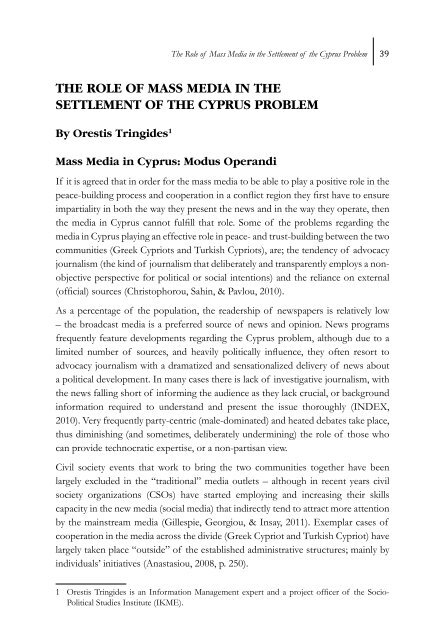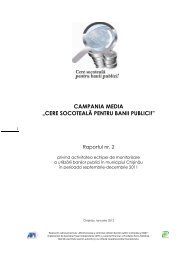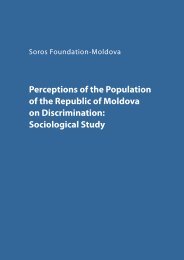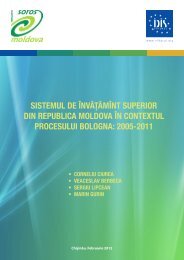Managing Intractable Conflicts: Lessons from Moldova and Cyprus
Managing Intractable Conflicts: Lessons from Moldova and Cyprus
Managing Intractable Conflicts: Lessons from Moldova and Cyprus
Create successful ePaper yourself
Turn your PDF publications into a flip-book with our unique Google optimized e-Paper software.
The Role of Mass Media in the Settlement of the <strong>Cyprus</strong> Problem<br />
39<br />
THE ROLE OF MASS MEDIA IN THE<br />
SETTLEMENT OF THE CYPRUS PROBLEM<br />
By Orestis Tringides 1<br />
Mass Media in <strong>Cyprus</strong>: Modus Oper<strong>and</strong>i<br />
If it is agreed that in order for the mass media to be able to play a positive role in the<br />
peace-building process <strong>and</strong> cooperation in a conflict region they first have to ensure<br />
impartiality in both the way they present the news <strong>and</strong> in the way they operate, then<br />
the media in <strong>Cyprus</strong> cannot fulfill that role. Some of the problems regarding the<br />
media in <strong>Cyprus</strong> playing an effective role in peace- <strong>and</strong> trust-building between the two<br />
communities (Greek Cypriots <strong>and</strong> Turkish Cypriots), are; the tendency of advocacy<br />
journalism (the kind of journalism that deliberately <strong>and</strong> transparently employs a nonobjective<br />
perspective for political or social intentions) <strong>and</strong> the reliance on external<br />
(official) sources (Christophorou, Sahin, & Pavlou, 2010).<br />
As a percentage of the population, the readership of newspapers is relatively low<br />
– the broadcast media is a preferred source of news <strong>and</strong> opinion. News programs<br />
frequently feature developments regarding the <strong>Cyprus</strong> problem, although due to a<br />
limited number of sources, <strong>and</strong> heavily politically influence, they often resort to<br />
advocacy journalism with a dramatized <strong>and</strong> sensationalized delivery of news about<br />
a political development. In many cases there is lack of investigative journalism, with<br />
the news falling short of informing the audience as they lack crucial, or background<br />
information required to underst<strong>and</strong> <strong>and</strong> present the issue thoroughly (INDEX,<br />
2010). Very frequently party-centric (male-dominated) <strong>and</strong> heated debates take place,<br />
thus diminishing (<strong>and</strong> sometimes, deliberately undermining) the role of those who<br />
can provide technocratic expertise, or a non-partisan view.<br />
Civil society events that work to bring the two communities together have been<br />
largely excluded in the “traditional” media outlets – although in recent years civil<br />
society organizations (CSOs) have started employing <strong>and</strong> increasing their skills<br />
capacity in the new media (social media) that indirectly tend to attract more attention<br />
by the mainstream media (Gillespie, Georgiou, & Insay, 2011). Exemplar cases of<br />
cooperation in the media across the divide (Greek Cypriot <strong>and</strong> Turkish Cypriot) have<br />
largely taken place “outside” of the established administrative structures; mainly by<br />
individuals’ initiatives (Anastasiou, 2008, p. 250).<br />
1 Orestis Tringides is an Information Management expert <strong>and</strong> a project officer of the Socio-<br />
Political Studies Institute (IKME).

















